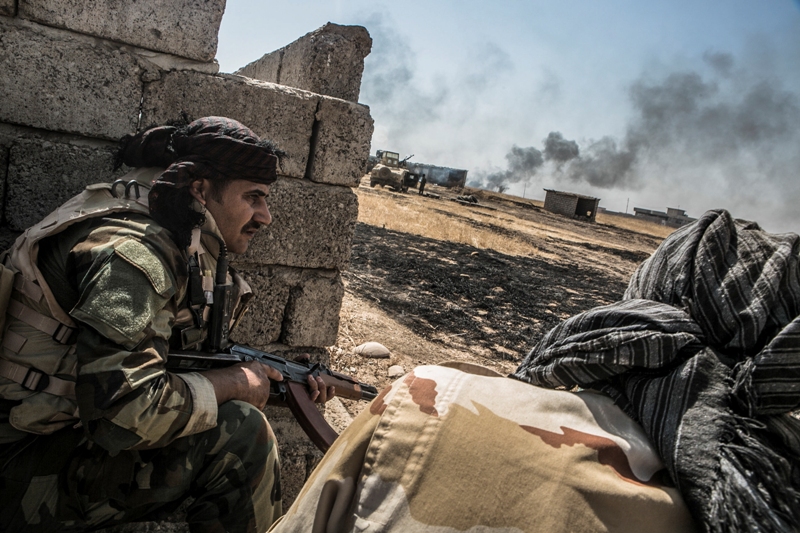The International Press Institute (IPI) today expressed concern over the deaths of two Kurdish journalists – one murdered in Duhok City in Iraq’s Kurdistan Region, the other killed while covering fighting between Kurdish Peshmerga forces and Islamic State group militants near Mosul – within a period of just two days.
Mustafa Said, a cameraman for Kurdistan TV, a satellite television channel owned by the Kurdistan Democratic Party (PDK), was killed on Sunday during a military operation against the Islamic State group in northern Iraq. His colleague, correspondent Hayman Nanqli, was seriously wounded in the attack.
Said’s death occurred during a major offensive launched by Kurdish forces near the Islamic State group’s stronghold of Mosul, some 400 km north of Baghdad. He was reportedly killed by a mortar round fired into a village recently taken by the Peshmerga. The journalists were embedded with Peshmerga forces involved in the operation southeast of Mosul.
The incident came one day after Wedat Hussein Ali, 28, a reporter for the pro-Kurdistan Workers Party (PKK) news agency RojNews, was abducted by unidentified armed men in the Malta neighbourhood of Duhok City, 75 km north of Mosul, and found dead on the side of a road around mid-day the same day.
Ali’s body displayed serious wounds and bruises, including severe injuries to the head, which suggested that he had been tortured before he was killed. A motive for the killing was not immediately known, although Ali’s family reportedly has accused the city’s security forces of murdering him because of his work.
According to the journalist’s brother, Darband, Ali was killed by the security forces because of his connection with the PKK and the fact that he worked for a news service affiliated with the group. The brother said security forces had summoned Ali multiple times and had asked him to quit the PKK and work for them instead.
Duhok security forces have denied any connection with the journalist’s murder and police said they have launched an investigation into the killing.
IPI Director of Advocacy and Communications Steven M. Ellis condemned Ali’s killing and called on the Kurdistan Regional Government (KRG) to bring those responsible to justice and to implement measures to ensure that all journalists working in the region are able to carry out their work without fear or intimidation.
“Advocacy groups have reported dozens of cases of violations against journalists in the Kurdistan Region in the past year alone, including threats, beatings and arbitrary detention, almost all of which have been committed with impunity,” he said. “A free, pluralistic and independent media is crucial to any democratic society. We urge authorities in the Kurdistan Region to conduct a thorough investigation into Mr. Ali’s murder and to do everything possible to bring the perpetrators to justice.”
Iraq continues to be one of the most dangerous countries in the world for journalists to carry out their profession. According to IPI’s Death Watch, at least 47 journalists have been killed in relation to their work in the country since the withdrawal of U.S. military forces from Iraq was officially completed in December 2011.
Of those 47, at least 36 journalists were targeted because of their profession, many of them publicly executed by Islamic State group militants for “spying”, “spreading propaganda” against the group, or violating the group’s regulations. The other 11 journalists were killed covering armed conflict.
At least four journalists have been killed in Iraq so far this year.
Saif Talal, a TV correspondent for Al-Sharqiya TV, and cameraman Hassan al-Anbaki were killed while returning from a reporting trip on Jan. 12. The men were on their way to the Miqdadiyah area, northeast of Baghdad, as part of an Iraqi general’s convoy when their vehicle lagged behind. Masked militiamen stopped the journalists’ car, forced them to exit and executed them.
One month later, Islamic State group militants publically executed Wathiq Abdulwahab by firing squad in Mosul on Feb. 9. Abdulwahab, a reporter for the local newspaper Hadbaa, was reportedly detained by the group after attempting to photograph a detention centre in Mosul’s Sukkar neighbourhood.
On July 13, , Ali Mahmud, a television cameraman for Al-Ghadeer, was killed when a roadside bomb detonated near the vehicle in which he and two other journalists were travelling in the Qayyarah area, north of Baghdad. The two other journalists with Mahmud, Ali Jawad and Ali Muftin, were injured, but survived the explosion.
